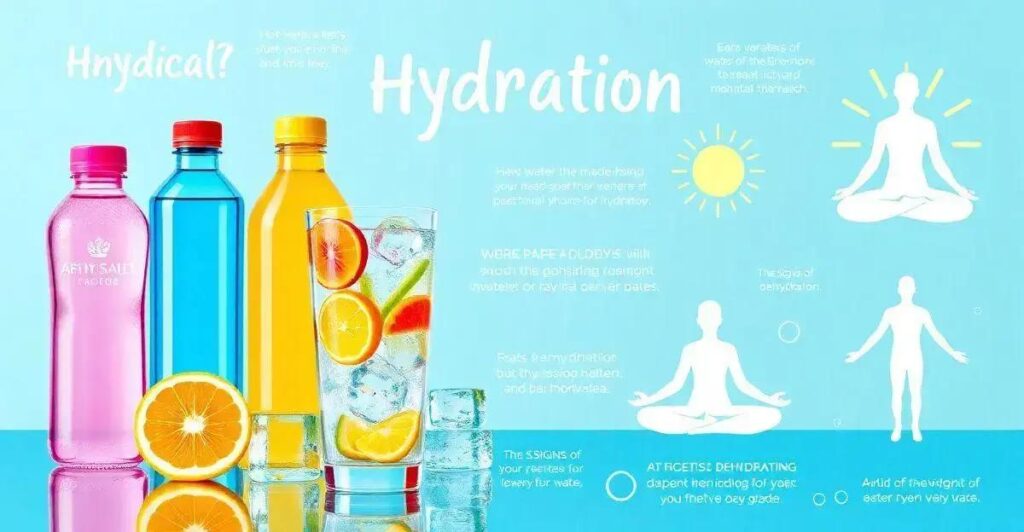Are you tired of feeling sluggish, fatigued, and unmotivated? Do you struggle to focus and stay energized throughout the day? It may be more than just a lack of coffee or a poor diet – it could be a lack of hydration.
Proper hydration is essential for physical and mental health, and neglecting it can have serious consequences.
In this article, we’ll explore the importance of hydration, signs of dehydration, and expert tips for staying hydrated and performing at your best.
Hydration: The Key to Optimal Performance
Proper hydration is essential for optimal performance in any activity, whether it’s a high-intensity workout, a long run, or a busy day at the office.
Even mild dehydration can cause fatigue, headaches, and decreased focus, which can negatively impact productivity and overall well-being.
In contrast, staying hydrated can boost energy levels, enhance mental clarity, and improve physical performance.
Additionally, hydration plays a crucial role in maintaining healthy skin, hair, and nails, as well as supporting immune function and digestion.
By drinking enough water throughout the day, individuals can optimize their performance, feel more alert and focused, and enjoy a range of physical and mental health benefits.
The Importance of Hydration for Physical Health

Proper hydration plays a vital role in maintaining overall physical health. Water helps to regulate body temperature, lubricate joints, and facilitate the digestion and absorption of nutrients.
It also helps to transport oxygen and nutrients to cells, and remove waste products. Even mild dehydration can cause a range of physical symptoms, including fatigue, headaches, and dry skin.
In severe cases, dehydration can lead to more serious health issues, such as heat stroke, kidney damage, and even death.
By drinking enough water throughout the day, individuals can help to prevent dehydration and support overall physical health and well-being.
Hydration and Mental Health: The Connection
Research has shown that even mild dehydration can cause mental fatigue, decreased focus, and impaired cognitive performance. In addition, dehydration can exacerbate symptoms of anxiety and depression, leading to a decline in overall mental well-being.
On the other hand, proper hydration has been linked to improved mood, reduced stress levels, and enhanced cognitive function. By staying hydrated throughout the day, individuals can support their mental health and improve their ability to focus, think clearly, and manage stress.
Furthermore, hydration plays a crucial role in maintaining healthy brain function, including the regulation of emotions and the formation of memories.
Signs of Dehydration and How to Recognize Them

Dehydration can manifest in a variety of ways, and it’s essential to recognize the signs in order to take corrective action.
Common signs of dehydration include headaches, fatigue, dry mouth, dark urine, and dizziness.
In addition, dehydration can also cause nausea, vomiting, and muscle cramps.
If left untreated, dehydration can lead to more serious complications, such as heat stroke, kidney damage, and even death.
To recognize dehydration, individuals should pay attention to their body’s physical and mental symptoms, and take steps to adjust their hydration habits accordingly.
This may include increasing water intake, avoiding diuretics, and seeking medical attention if symptoms persist or worsen.
Tips for Staying Hydrated Throughout the Day
Staying hydrated throughout the day requires a combination of awareness, planning, and habit.
Start by setting a daily hydration goal and tracking your progress. Carry a refillable water bottle with you at all times and take regular sips.
Incorporate hydrating foods into your diet, such as watermelon, cucumbers, and celery.
Limit your intake of diuretic beverages like coffee and tea, and avoid sugary drinks that can actually dehydrate you.
Take breaks throughout the day to stretch and move your body, which can also help increase blood flow and hydration.
Finally, prioritize sleep and aim for 8-10 hours per night to help your body repair and recharge.
The Benefits of Proper Hydration for Athletes

Athletes who prioritize proper hydration can experience a range of benefits that enhance their performance and overall well-being.
Proper hydration helps to regulate body temperature, lubricate joints, and facilitate the delivery of oxygen and nutrients to muscles.
It also helps to remove waste products and reduce muscle cramps and soreness.
Additionally, hydration plays a crucial role in maintaining proper blood volume, which is essential for maintaining blood pressure and transporting nutrients and oxygen to the brain.
For athletes, proper hydration can help to improve endurance, reduce fatigue, and enhance mental clarity and focus.
By prioritizing proper hydration, athletes can optimize their performance and achieve their goals.
Frequently Asked Questions about Hydration
What are the benefits of proper hydration for athletes?
Proper hydration helps to regulate body temperature, lubricate joints, and facilitate the delivery of oxygen and nutrients to muscles. It also helps to remove waste products and reduce muscle cramps and soreness.
How can I recognize signs of dehydration?
Common signs of dehydration include headaches, fatigue, dry mouth, dark urine, and dizziness.
What are some tips for staying hydrated throughout the day?
Carry a refillable water bottle with you at all times, drink water regularly, and limit your intake of diuretic beverages like coffee and tea.
How does hydration impact mental health?
Dehydration can exacerbate symptoms of anxiety and depression, while proper hydration has been linked to improved mood and reduced stress levels.
What are the importance of hydration for physical health?
Proper hydration helps to regulate body temperature, lubricate joints, and facilitate the delivery of oxygen and nutrients to muscles.
Can hydration improve performance?
Yes, proper hydration can improve endurance, reduce fatigue, and enhance mental clarity and focus.




